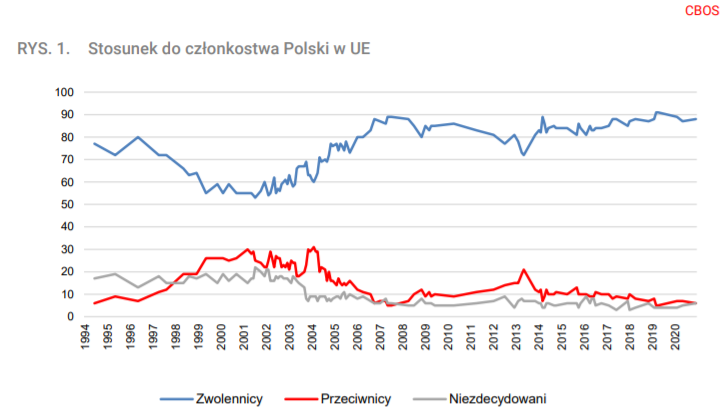The prime minister has denied that there is any chance of Poland exiting the European Union, despite his government saying that it has no plans to implement two rulings issued last week by the Court of Justice of the EU (CJEU) regarding a disciplinary system for Polish judges.
“There is no risk of Polexit; this is a kind of fantasy,” said Mateusz Morawiecki, referring to claims by opposition figures and some legal commentators that his government’s actions will effectively place Poland outside the European legal order, and even eventually the EU itself.
“There is neither such a risk nor such intentions,” added the prime minister, quoted by the Polish Press Agency (PAP). “It is a kind of political emotion that our opponents are trying to arouse.”
Morawiecki described his government’s approach as “Eurorealism”, which involves “defending those areas in which, when joining [the EU], like other countries, we did not agree to transfer competences to European institutions”.
“We are a strong country in a strong European Union, and it is difficult to imagine the European Union without Poland,” added the prime minister.
Poland’s government has argued that the EU has no authority to interfere with the functioning of judicial systems in member states. It was boosted last week by the Polish constitutional court – a body seen as being under government influence – which effectively ruled that certain CJEU orders could be ignored.
On Friday, a spokesman said that the government was “not planning” to implement any changes in response to rulings by the CJEU, which found its disciplinary chamber for Polish judges to be in violation of European law and ordered it to be immediately suspended.
The head of the Polish Supreme Court – in which the disciplinary chamber is based – has said that she will allow it to continue functioning. Yesterday, the chamber held a hearing in defiance of the CJEU’s order to cease all activity.
Unofficial reports in Polish media yesterday indicated that the European Commission would give Poland a deadline of one week to comply with the rulings or else face financial penalties.
This is hair-raising. Polexit by default. https://t.co/GSnC4nmOTl
— Ben Stanley (@BDStanley) April 16, 2021
Poland’s largest opposition party, the centrist Civic Platform (PO), has long argued that the national-conservative Law and Justice (PiS) party is leading the country towards “Polexit” due to its clashes with Brussels and violations of the rule of law.
A number of legal scholars have also raised concern that, while there is no mechanism for a country to be thrown out of the EU, Poland has effectively “left the EU legal order”, in the words of R. Daniel Kelemen, professor of political science and law at Rutgers University.
Asked yesterday if Poland would today be admitted to the EU, Włodzimierz Wróbel, a Polish Supreme Court judge, replied: “No, not with such a [judicial] system violating the principles of independence of the courts.” Piotr Hofmański, the president of the International Criminal Court, recently said the same.
However, while the PiS government has enjoyed difficult relations with Brussels, it is also aware that support for EU membership in Poland – which is the largest net recipient of European funds – remains strong.
In regular polling by CBOS, a state research agency, support among Poles for membership has not dropped below 70% since 2005. Since PiS came to power in 2015, it has actually risen, passing 90% in 2019 and remaining at 88% at the end of 2020.
However, various polling has also found that most Poles see the government’s judicial policies as an attempt to violate the rule of law and support the EU’s intervention in the issue.

Support for (blue line) and opposition to (red line) Poland’s members of the EU (CBOS, “Polacy o warunkowości w budżecie UE“, 2020)
Main image credit: Krystian Maj/KPRM (under CC BY-NC-ND 2.0)

Daniel Tilles is editor-in-chief of Notes from Poland. He has written on Polish affairs for a wide range of publications, including Foreign Policy, POLITICO Europe, EUobserver and Dziennik Gazeta Prawna.




















